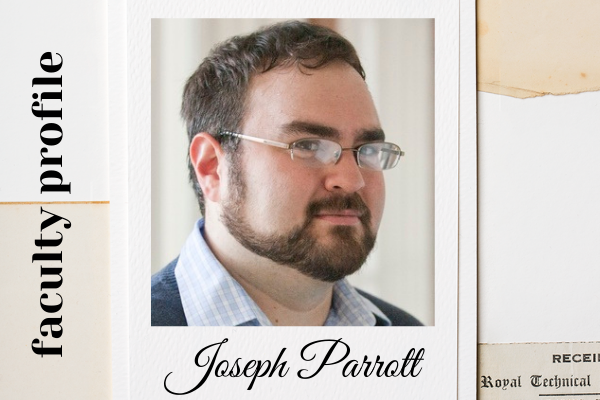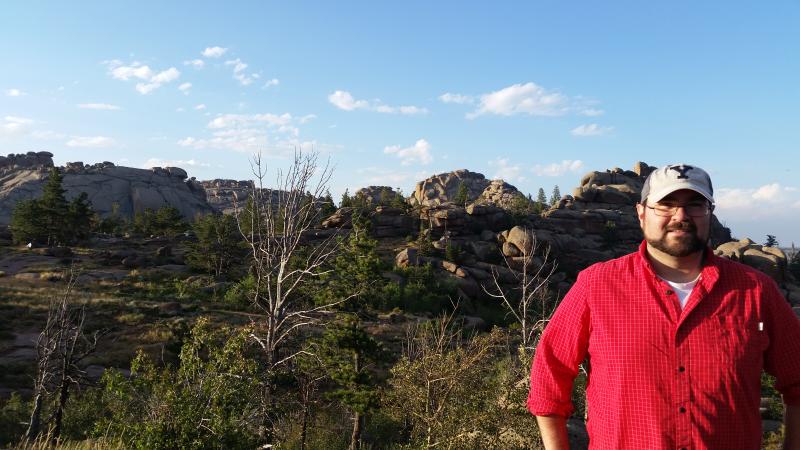Faculty Q&A Spotlight: Joseph Parrott

What is your favorite class to teach? Why?
3501: US Foreign Policy from 1920-Present. I see it as really important for anyone trying to understand the United States’ place in the world, or for that matter anyone who plans to vote. It covers the time period in which the United States went from regional power to global superpower and the very specific, contingent calculations that policymakers made about where and how to intervene, which a lot of people just accept now as the way it has always been or should be. It’s a great opportunity to think critically about the use of American power and how this has influenced world events, but also how this power has reshaped the United States itself. That latter part lets me delve into cultural reflections of foreign policy alongside the serious policy stuff, looking at everything from Captain America punching Hitler in the face to debates over the Iraq War in 2003 that played out in music industry.
Tell us about your current research.
I just finished editing a volume that considers the radical Third World ideology of Tricontinentalism, which used armed revolt and confrontational diplomacy in the 1960s and 1970s to champion the interests of the Global South against the traditional power of the industrialized North. Right now, I’m finishing up a book on the creation of the multiracial activist movement that supported Portuguese African revolutionaries in the 1970s by challenging established Cold War politics and U.S. foreign policies. I also have a side project looking at the way superhero comics reflected and perpetuated American exceptionalism and the threat of fascism as antithesis to national values. I’m not great at focusing.
How did you first get started in the field of history? What inspired you?
My grandfather was a proud Italian-American and WWII vet, so I grew up with him talking about that history and handing me books he had just read, which rubbed off. Plus, I grew up in Richmond, VA where you practically trip over Revolutionary and Civil War history and have easy access to the Smithsonian. My parents were always willing to take me to a museum on the weekend, so that became something I loved. By the time I got to college, we were involved in both the Afghanistan and Iraq wars – neither of which did Congress formally declare wars – so I ended up gravitating toward foreign policy to help make sense of those conflicts.
What’s a fun fact about you that we might not know?
I know how to tell the difference between 17th century pottery by licking it, sorta? I interned at the state lab that preserves historic artifacts in Virginia in high school and – among other things – reorganized their entire pottery collection pulled mostly from a bunch of old plantations that got turned into golf courses. My boss encouraged me to lick 300 year old pottery to see if it was salt glazed stoneware. I don’t think I did it more than once, not because it had been in the ground but because it had either been sitting in a box or in a rusted out shelving unit for 50 plus years.

What do you do for entertainment in your “down time” (during COVID or non-COVID)?
I really like traveling, and then exploring local architecture when I do. Most summers I try to go somewhere new, where I usually combine a bit of research and a lot of wandering around new places to get a feel for them. I love visiting world cities – Amsterdam being one of my favorites, though I avoid downtown in favor of the outer ring. But I also travel a decent amount domestically, spending at least a day in roughly 40/50 states. COVID has made that a bit difficult, but my wife and I have visited a lot of parks and cities in Ohio, including getting into the incredible native American sites that stretch from Newark down towards Cincinnati – which are really, really incredible. Sites like Fort Ancient, Alligator Mound, and the Hopewell Culture National Parks are mostly outside so they make great daytrips from Columbus even with COVID sometimes closing the attached museums.
My family tree probably pushed me toward international history. The grandfather I mentioned above was a first generation immigrant whose oldest sibling was born in Italy. But one grandparent traced his roots back to the colonial founders of Virginia, which meant my undergrad institution had a 17th century deed signed and sealed by my ancestors in its special collections. And another grandparent was Puerto Rican, born between annexation and the granting of statutory citizenship in 1917. Hearing these varied stories while growing up, I thought about events from textbooks in terms of my own family history, so I suspect it was natural that I have always been curious about how the country fit into global narratives ranging from settler colony to multi-ethnic empire.
